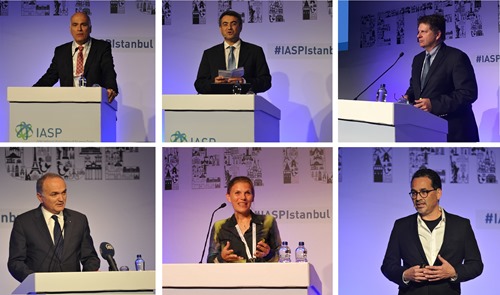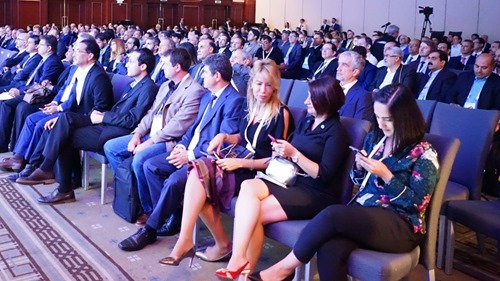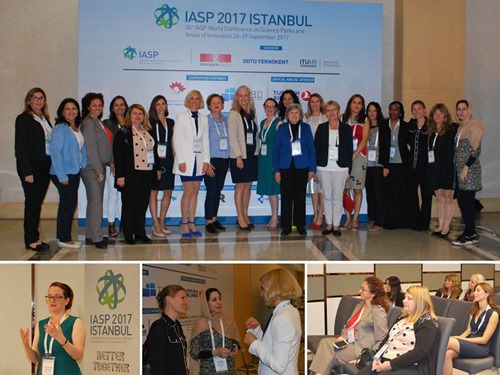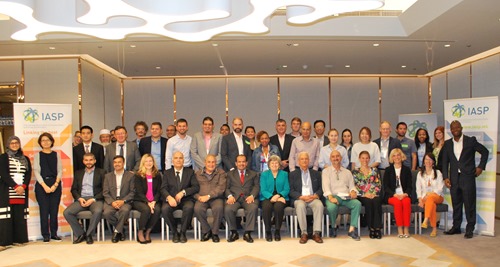Global knowledge sharing at IASP Istanbul
/2017_10_04_Istanbul_collage_2.jpg)
Teknopark Istanbul, ITU ARI Teknokent and ODTU Teknokent, recently welcomed 62 speakers and over 500 delegates from 46 different countries to the 34th IASP World Conference in Istanbul, Turkey.
With the theme of “Science parks and innovation ecosystems: Articulating future trends and strategies,” the conference offered new insights into how Science Parks and other Areas of Innovation can prepare for the future and continue to lead their cities and regions through a world of rapid technological change.
Prior to the main event, the IASP Pre conference seminar brought together newcomers to the industry to learn the fundamentals of science park management from six global experts, moderated by IASP Chief Operations Officer Ebba Lund. Members of our Women in IASP subnetwork from around the world also took the opportunity to meet during the conference, where they shared experiences and discussed steps to raise the profile of women in our industry.
The World Conference was officially opened by the IASP President, Josep Piqué (La Salle Technova, Barcelona) alongside IASP Director General Luis Sanz, before the conference programme began with a keynote speech from Frank Soqui (USA), General Manager of Intel’s Virtual Reality Group. He shared insights into the potential of virtual reality in education, sport, retail and medical surgery, emphasising how essential science parks are to the development of these immersive technologies which can change our daily lives. Dr. Faruk Özlü, Turkish Minister of Science, Industry and Technology, made an address on the second day, underlining his commitment to Turkey’s growing innovation ecosystem.
The social impact of technology on our daily lives, be it through VR, robotics or apps to improve access to education, was a major theme during the plenary sessions that followed, as well as the ethical context of this new technology, the importance of the human element, and alternative models in emerging economies. The changing nature of the space provided by science parks and the evolution of their services was also addressed as part of the overarching look at the future of the industry, alongside innovative funding to develop and strengthen innovation ecosystems.
IASP Vice President Paul Krutko moderated the first plenary, which explored new concepts including Living Labs in Sweden, the Chinese innovation model, and how the whole city of Moscow can function as an innovation ecosystem, as well as management approaches from Spain and Brazil. The high-speed Pitch session brought an international perspective on the future of science parks with speakers from The Netherlands, Ivory Coast, China, Iran, Brazil, Pakistan, Austria, Turkey and Russia sharing knowledge and experiences on effective collaboration, ecosystem building, placemaking and challenging perceptions in just 4 minutes. Delegates heard about how approaches to funding work in very small countries like Qatar and Estonia, and how they differ in much larger emerging economies like Brazil, and what each model can learn from others around the world.
Invited speaker Robin Grimes spoke about the international collaboration that can grow out of “diplomacy through science”: at an IASP conference, we see “diplomacy through science parks” in action.
/)





/canvascolor(0xffffffff)/New_Logo_sapiens_(1)_page-0001.jpg)
/canvascolor(0xffffffff)/MemberLogo-89401-462801.jpg)
/canvascolor(0xffffffff)/pcyt_3.jpg)
/canvascolor(0xffffffff)/2025_01_30_The_Netherlands_Noviotech_campus.png)
/canvascolor(0xffffffff)/buildings2.png)
/canvascolor(0xffffffff)/2025_11_04_Saudi_Arabia_Dhahran_Techno_Valley.png)
/canvascolor(0xffffffff)/MemberLogo-56301-60901.jpg)
/canvascolor(0xffffffff)/VUTSouthernGauteng.png)
/canvascolor(0xffffffff)/IT_park-01_1.png)
/canvascolor(0xffffffff)/2017_11_10_Sweden_IDEON_Science_Park.jpg)
/canvascolor(0xffffffff)/HIPB_Logo_2.jpg)
/canvascolor(0xffffffff)/BizMaker_payoff__grey_1.png)
/canvascolor(0xffffffff)/IMG_6669_1.png)
/canvascolor(0xffffffff)/2017_07_25_Germany_Technologiepark_Heidelberg.jpg)
/canvascolor(0xffffffff)/2017_08_04_fundecyt-pctex-h.png)
/canvascolor(0xffffffff)/MemberLogo-43501-149701.jpg)
/canvascolor(0xffffffff)/_______logo_1.png)
/canvascolor(0xffffffff)/2020_09_09_Sweden_Luleea_SP.png)
/canvascolor(0xffffffff)/2025_09_04_Malaysia_MRANTI.jpg)
/canvascolor(0xffffffff)/LOGO-PC-TEC.png)
/canvascolor(0xffffffff)/Lion_scienc_park_black_trans_3.png)
/canvascolor(0xffffffff)/2017_11_13_Spain_Tecnocampus_3.jpg)
/canvascolor(0xffffffff)/Logo_22.png)
/canvascolor(0xffffffff)/2017_11_17_Taiwan_Southern_Taiwan_SP.png)
